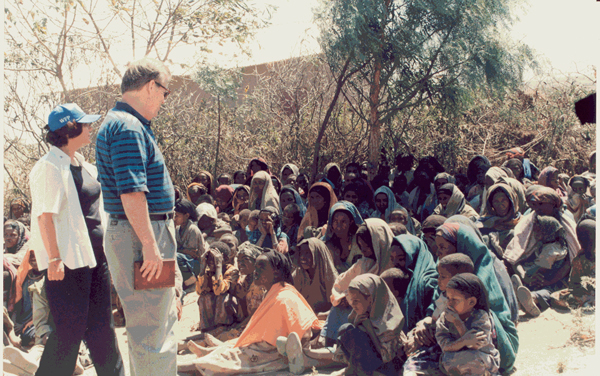
U.S. ambassador and RPCV Tony Hall returns to Ethiopia - Plumpy Nut controversial, and lifesaving, too
Plumpy Nut controversial, and lifesaving, too
By Ellen Belcher
Dayton Daily News
Dayton Daily News Editorial Page Editor Ellen Belcher has been traveling with Ambassador Tony Hall this week in Ethiopia. This is the second of six letters home.
In Ethiopia, there's only poor and poorer.
What sets one family apart from another is that one may have a cow, a donkey or a few goats and the other doesn't. If there's a bad harvest, the well-off can lose "everything." They're forced to sell the cow or eat the plumpest kernels of this year's harvest that are supposed to be saved as next year's seeds. And in no time, there's even less to eat.
Many of this country's poor can get still poorer.
Last Wednesday, we visited another feeding center in a remote section of the highlands in Bensa Ware, where mothers bring their babies and toddlers who are creeping toward death. When their little muscles start wasting, it's called "droopy pants" because their skin just hangs.
This center was different than the one we had visited the day before.
Again, children are divided between those being near and nearest to death. The babies are weighed naked in a hanging swinglike scale, and, in many cases, this is the only time that they cry.
Depending on how underweight and sickly they are, their mothers are given a fortified grain ration that they carry home in plastic pitchers, or if their babies are "acutely malnourished" they're given small foil pouches of a pasty formula called Plumpy Nut. Those babies are fed dribbles at a time of what basically is highly enriched peanut butter.
Unlike the formula used at the first site, Plumpy Nut doesn't have to be refrigerated and it doesn't spoil easily. The mothers can take the treatment home and they don't have to remain at the clinic, away from their other children. They still have to make what is often a several-hours-long walk to the clinic biweekly, though.
Plumpy Nut is controversial because really sick children are being sent home instead of kept under a doctor's care. The therapy has been used in Ethiopia only for a year or so, and it's being tested in two other countries.
Like many efforts in Ethiopia, it is a compromise aimed at saving lives and stretching money. One relief worker said that 10 children can be treated with Plumpy Nut for what it costs to treat one child with the more common liquid formula.
A Belgian nutritionist from Save the Children-U.S., who led our quick tour, said she's seeing fewer starving children this year. She is in the process of closing down the emergency center and will be handing over the work to a local health service.
Another relief worker later observed that closing an emergency center is one of the hardest decisions that agencies have to make. "How do you close a feeding center when there's always going to be another hungry kid, who may be dying, at your door?"
Our next stop was a government-run distribution site that was handing out aid from the World Food Program. Typically a World Food Program ration in Ethiopia includes grain, vegetable oil and maybe some haricot beans. The agency has spent enormous energy trying to "target" its food aid to the neediest in the most drought-affected areas. Elders of each community are supposed to decide who needs the rations most — widows go to the top of the list — and then those individuals come to the distribution site. Once the food is given out, though, relief workers say it's almost always shared with others in the village. There's a saying in Ethiopia that if you eat alone, you die alone.
Another problem is that someone who isn't "needy" today may be tomorrow if, for instance, the donkey has to be sold. Situations change quickly and sometimes horrifically. The wait to move onto an aid list can be deadly.
The alternative to limiting who gets free food is to distribute it to everybody, which would be opposed by many Ethiopians even if it were possible. Again and again, village elders emphasized that they are embarrassed to depend on the world's charity.
We were gone 11 hours on this day, traveling at speeds and a distance that exhausted even the seasoned relief workers. Most of the roads were passable only to four-whee drive vehicles, and one bridge in particular had everyone crossing their fingers.
The last stop was a U.N. Food and Agriculture seed distribution site. We walked through small plots of tomatoes, green beans, peppers and cabbages. The initiative is encouraging the villagers to diversify their plantings.
Most of the soil in Ethiopia, besides being horribly eroded, has been depleted from overplanting of the same crop, typically maize or enset, also known as false banana. Adding variety to the crops means a better diet, and some farmers may be able to grow enough to feed their families and even have enough left over to sell. Of the more than 2,300 people participating in this project, almost half told relief workers that they no longer needed food aid.
There was one moment Wednesday that had everybody laughing. To prepare the enset, women sit on the ground scraping the long cylindrical stems of the towering broadleaf plant. This produces huge piles of cole slaw-like cuttings that are stored in large ceramic jugs and fermented for 20 days. Ultimately, a nutrient-poor, wet, pastelike concoction is produced.
Ambassador Tony Hall got a lesson in the processing and then was offered a sample. He sheepishly declined.
Hall, who 11 years ago this month went on a 22-day fast to protest Congress' lack of support for his anti-hunger initiatives, said he was again fasting.

